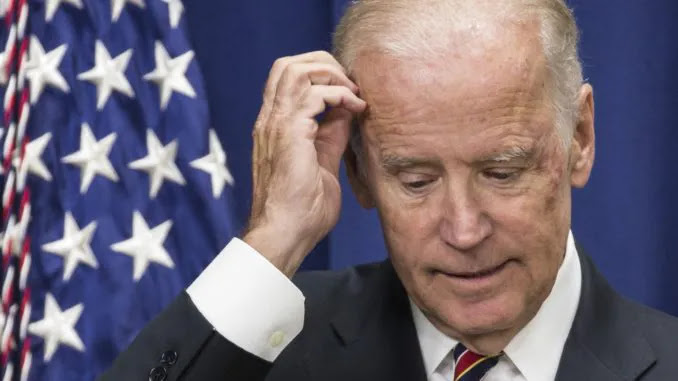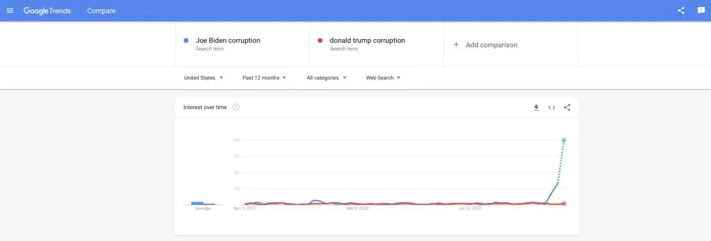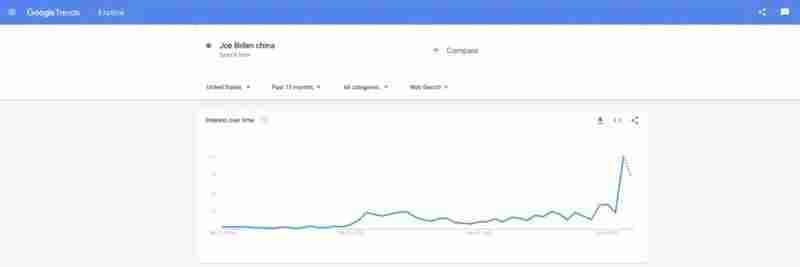
- 2020-11-01
- 0.0 Reitingas
- 616 Peržiūrų
- Aptarti
Democrat presidential nominee Joe Biden’s campaign is in crisis just days before the election, as “Joe Biden corruption” begins trending on Google, suggesting the Democrat Party’s collusion with mainstream media to circle the wagons around the embattled former Vice President and ignore his scandals has failed spectacularly.
It appears the truth is starting to leak into the national consciousness and the dam wall has broken. People are waking up.
WesternJournal report: If you’ve even a passing interest in the curious business relationships Hunter Biden and what his father knew about them, you’re probably familiar with the saga of Twitter and the New York Post. Earlier this month, the paper published emails said to be from the hard drives of computers Hunter took in for repair and never claimed.
In one, an official from Burisma Holdings — a Ukrainian energy company which had Hunter Biden on its board despite the fact he’s known neither for his expertise in the energy field nor his experience in the corporate or political atmosphere of Eastern Europe — appeared to thank Hunter for introducing him to then-Vice President Biden.
In another, a possible deal with what was then China’s largest private energy firm was discussed along with talk about “remuneration” for Hunter Biden and others. The email included the cryptic phrase “10 held by H for the big guy?” A former business associate of Hunter Biden’s, Tony Bobulinski, later said “the big guy” in the email was Joe Biden.
Joe Biden’s campaign has never formally denied the emails were Hunter Biden’s; it merely claimed the whole thing is a disinformation campaign. The campaign did deny Biden officially met with the Burisma official, although it effectively conceded to Politico some kind of short encounter between the two may have taken place.
Biden said last year that he has “never spoken to my son about his overseas business dealings” and that remains the official line, even though the Post pieces seem to contradict that.
Twitter claimed the piece potentially contained hacked information — despite no evidence the data obtained from the hard drives was hacked in any way — and screen shots which showed the email addresses of the individuals involved. Thus, the company briefly embargoed users from sharing it, and also locked the New York Post out of its account.
While the social media giant eventually changed how it enforces its “Hack Materials” policy, it still said that the New York Post had to delete the story to restart posting. The Post could then tweet the story again, since it now met Twitter’s standards.
Essentially, what Twitter wanted the New York Post to do was admit it had done something wrong. The Post wasn’t willing to kowtow and the stalemate lingered for two weeks.
How did that end up for Twitter? While Google searches don’t necessarily correlate to information suppression, they also give us an idea of whether it’s working or not.
There wasn’t really a bump until the week of Oct. 11-17. Oct. 14 is when the New York Post published the first story featuring the emails. Twitter locked the Post out shortly afterward.
While searches for “Joe Biden Burisma” have had more peaks over the past year, Oct. 11-17 saw, by far, the highest number of people searching the term:
Meanwhile, here were searches for “Joe Biden China,” which appears to have gained popularity right as Tony Bobulinski entered our cultural discourse:
For comparison, meanwhile, here’s “Joe Biden corruption” against “Donald Trump corruption”:

Keep in mind, these are the final days of a nearly two-year campaign during which our collective American neurons have been sandblasted with the message that President Trump is fundamentally corrupt and that, when he isn’t flouting norms and engaging in dictatorial thuggery, he’s using the office to enrich himself and his family.
What’s remarkable, then, is whose alleged corruption we’re searching up information about.
After a two-week battle, Twitter relented and let the New York Post back into its Twitter account:
We’re baaaaaaack https://t.co/D39qdLGMdV pic.twitter.com/SkVtp4o9ew
— New York Post (@nypost) October 30, 2020
No matter the winner or the effect the Post’s stories had on voters’ perceptions of Joe Biden, those who look at the media will long question what effect Twitter’s censorship, lockouts, reversals and jesuitical explications of its policies had in amplifying that narrative.
Whether or not Twitter believed its public explanations on the matter or wanted to act as a counterweight to a story that raised red flags for them — either because of inherent organizational biases or fear of platforming disinformation — its strategy clearly didn’t work. This will be, whether social media likes it or not, part of the narrative until Election Day — and that’s going to be trouble for Joe Biden.
Pasaulio naujienas kitaip... skaitykite Paranormal Telegram, FB ir X(twitter) kanale...kadangi jau perskaitėte šį straipsnį iki pabaigos, prašome Jus prisidėti prie šio darbo. Skaitykite „Paranormal.lt“ ir toliau, skirdami kad ir nedidelę paramos sumą. Paremti galite Paypal arba SMS. Kaip tai padaryti? Iš anksto dėkojame už paramą! Nepamirškite pasidalinti patikusiais tekstais su savo draugais ir pažįstamais.
Turite savo nuomone, tapk autoriumi, prisijunk ir rašykite bloge. Dalinkitės receptais, sveikatos patarimais, nutikimais, susidūrėte su nekasdieniškais reiškiniais. Galite išversti iš užsienio kalbos, talpinkite su nuoroda. Laukiame Jūsų straipsnių, naujienų, apžvalgų ar istorijų!
Susijusios naujienos
Būkite pirmi, kurie pasidalins savo nuomonėmis su kitais.
Skaityti daugiau
Skaityti daugiau
Skaityti daugiau
Skaityti daugiau
Skaityti daugiau
Skaityti daugiau
Skaityti daugiau



